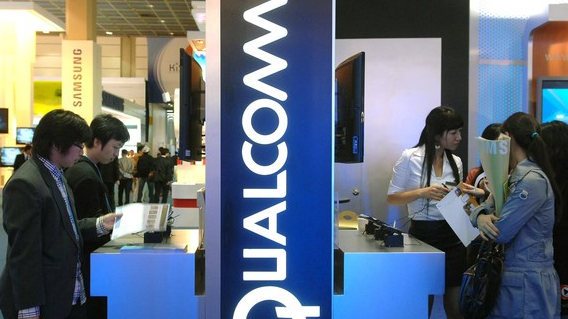A proposed tie-up between rival semiconductor manufacturers Broadcom and Qualcomm is expected to come under particular regulatory scrutiny in China as authorities there look to protect domestic players in a key industrial sector.
半导体制造商博通(Broadcom)与竞争对手高通(Qualcomm)之间的拟议并购预计将受到中国特别的监管审查,因为中国当局希望在这一重要行业保护本国企业。
“Given China’s ambitions in the chip and mobile telecoms space, I can’t see the Chinese authorities taking kindly to a Broadcom-Qualcomm merger. It would likely create the biggest and most powerful player in the mobile chip market,” said a Hong Kong-based technology lawyer who requested anonymity due to the sensitivity of the subject.
“考虑到中国在芯片和移动电信领域的野心,我看不出中国当局希望博通和高通合并。合并后的博通和高通可能会成为移动芯片市场上最大、最强的一家企业,”一名由于该话题的敏感性要求匿名的香港技术行业律师说。
Broadcom on Monday unveiled an unsolicited $130bn bid for Qualcomm, which would be the single largest pure technology deal in history and create a $200bn manufacturing giant making semiconductors crucial for everything from smartphones to computers.
博通周一公布了其向高通提出的1300亿美元的主动收购要约,这将是史上最大规模的科技行业并购,并将缔造一家市值2000亿美元的半导体制造巨头,半导体产品对从智能手机到电脑的一切产品都至关重要。
Yet lawyers say the deal could encounter its biggest challenge in China, where policymakers are looking to foster domestic chip champions, such as SMIC and Tsinghua Unigroup, and reduce reliance on foreign companies. They say there is a growing chance that China could use its antitrust review to modify global deals or add commercial requirements to align with its own industrial policy.
但律师们说,这笔交易可能会在中国遭遇最大的挑战,中国的政策制定者们正打算培养本国的芯片领军企业,如中芯国际(SMIC)和清华紫光(Tsinghua Unigroup),并减少对海外企业的依赖。他们称目前有一个发展机会,即中国可以利用其反垄断审查制度更改国际交易,或增加商业条件以配合自身的产业政策。
The Committee on Foreign Investment in the United States has blocked a number of Chinese bids for US tech companies as the two countries become more protective over technology deals — an issue US President Donald Trump is likely to raise when he arrives in China on Wednesday. Steve Mollenkopf, Qualcomm’s chief executive, is one of 29 US business leaders accompanying the president on his trip.
随着中美两国对技术领域的交易采取越来越保护主义的立场,美国外国投资委员会(Committee on Foreign Investment)已经阻止了很多起中国企业对美国科技企业的收购——美国总统唐纳德?特朗普(Donald Trump)在周三抵达中国时,有可能会提到这个问题。高通首席执行官史蒂夫?莫伦科夫(Steve Mollenkopf)是陪同特朗普此行的29名美国商界领导人之一。
Although relatively nascent, China’s antitrust approval process has become an important consideration for global dealmakers. Since 2008, China’s ministry of commerce has required all deals involving parties with a combined global turnover exceeding Rmb10bn ($1.5bn) or combined China income exceeding Rmb2bn ($300m) — an unusually low filing threshold — to apply for Chinese merger approval.
虽然刚问世不久,但中国的反垄断审批过程已成为全球并购交易者的一个重要考虑因素。自2008年以来,中国商务部已要求参与方全球营业额合计超过100亿元人民币(15亿美元),或在中国的营业额合计超过20亿元人民币(3亿美元)的所有交易——这个门槛低得出奇——申请中国的并购审批。
Although the Chinese government intervenes in a lower number of deals than its European counterparts, antitrust lawyers say the country has become more confident in delaying or changing deals.
虽然中国政府干预的交易数量低于欧洲的反垄断机构,但反垄断律师们表示,中国对推迟或更改交易越来越自信。
“There is a suspicion — but it is just a suspicion — that at least sometimes, China uses the review process to raise other concerns from stakeholders about a deal that may not be strictly antitrust,’’ said a Beijing-based M&A lawyer who declined to be named because of a client relationship.
“有一种怀疑——但仅仅是怀疑——至少某些时候,中国在利用审查过程引起利益相关者对某项交易的其他关切,这种关切可能并非是严格的反垄断方面的,”北京一名因客户关系而拒绝具名的并购律师表示。
Mofcom introduced an expedited 30-day review process for more straightforward deals in 2014. However, a deal as big and significant as the potential Broadcom-Qualcomm merger would almost certainly be required to undergo the full 180-day approval process.
中国商务部2014年为一些较为简单的交易引入了一种为期30天的加速审查程序。然而,像博通和高通合并这种重大交易,几乎无疑必须经过180天的全面审批流程。
“If a deal does not help Chinese economic growth, then it will not likely pass. [Mofcom] must see if the deal helps the domestic industry sector and policies, as well as global competition,” said Zhou Chunsheng, a finance professor at the Cheung Kong Graduate School of Business in Beijing.
“如果一笔交易对中国的经济增长没有帮助,那它很可能不会通过。(商务部)一定要看到一笔交易对中国国内的产业部门、政策以及全球竞争力有无助益。”北京长江商学院(Cheung Kong Graduate School of Business)金融学教授周春生说。
China typically prefers to make conditional approvals for deals rather than block them outright, for instance requesting that parties divest of assets within China or make commitments to certain market conditions for a limited period of time.
中国通常更倾向于有条件地批准而不是彻底阻止,例如要求交易方对在中国的资产撤出投资,或在一定时期内对某些市场条件作出承诺。
“I expect Mofcom won’t go so far as to block the deal, but I expect they will ask for concessions and deals for Chinese companies,’’ said the Hong Kong technology lawyer.
“我预计中国商务部不会阻止这笔交易,但我预计他们会要求博通和高通给予中国企业某些让步和交易,”之前那位香港技术行业的律师表示。

Both Broadcom and Qualcomm have previously come under Chinese regulatory scrutiny.
博通和高通此前都受到过中国监管机构的审查。
In August, Mofcom conditionally approved Broadcom’s efforts to acquire telecoms company Brocade for $5.9bn, a deal that has been delayed by Cfius in the US. To gain Chinese approval, Broadcom must maintain transaction conditions of certain products for 10 years within China.
今年8月,中国商务部有条件地批准了博通对电信公司博科(Brocade)的59亿美元收购,这笔交易在美国已经被美国外国投资委员会推迟。为赢得中方的批准,博通必须在中国保持某些产品的交易条件长达10年。
In 2015, Qualcomm was forced to fork over a record $975m in fines after Mofcom found it guilty of charging Chinese customers both the cost of its products plus patent royalties.
2015年,中国商务部认定高通让中国客户支付其产品成本外加专利许可费,之后高通被迫交出9.75亿美元的创纪录罚金。













